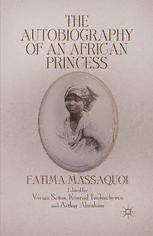
The Autobiography of an African Princess PDF
Preview The Autobiography of an African Princess
The Autobiography of an African Princess T A HE UTOBIOGRAPHY OF AN A P FRICAN RINCESS Fatima Massaquoi Edited with an Introduction by Vivian Seton, Konrad Tuchscherer and Arthur Abraham THE AUTOBIOGRAPHY OF AN AFRICAN PRINCESS Copyright © Fatima Massaquoi, Vivian Seton, Konrad Tuchscherer and Arthur Abraham, 2013. Softcover reprint of the hardcover 1st edition 2013 978-0-230-60958-7 All rights reserved. First published in 2013 by PALGRAVE MACMILLAN® in the United States—a division of St. Martin’s Press LLC, 175 Fifth Avenue, New York, NY 10010. Where this book is distributed in the UK, Europe and the rest of the world, this is by Palgrave Macmillan, a division of Macmillan Publishers Limited, registered in England, company number 785998, of Houndmills, Basingstoke, Hampshire RG21 6XS. Palgrave Macmillan is the global academic imprint of the above companies and has companies and representatives throughout the world. Palgrave® and Macmillan® are registered trademarks in the United States, the United Kingdom, Europe and other countries. ISBN 978-1-349-37615-5 ISBN 978-1-137-10250-8 (eBook) DOI 10.1057/9781137102508 Library of Congress Cataloging-in-Publication Data Massaquoi, Fatima, 1904?-1978, author. The autobiography of an African princess / by Fatima Massaquoi ; edited with an introduction by Vivian Seton, Konrad Tuchscherer, and Arthur Abraham. page cm 1. Massaquoi, Fatima, 1904?-1978. 2. Vai (African people)—Social life and customs—20th century. 3. Vai (African people)—Germany– Social conditions—20th century. 4. Vai (African people)—United States—Social conditions—20th century. 5. Liberia—Social life and customs—20th century. I. Seton, Vivian, 1950–editor. II. Tuchscherer, Konrad, 1970- editor. III. Abraham, Arthur, 1945–editor. IV. Title. DT630.5.V2M37 2013 966.620049634092—dc23 2013017229 A catalogue record of the book is available from the British Library. Design by Newgen Knowledge Works (P) Ltd., Chennai, India. First edition: November 2013 10 9 8 7 6 5 4 3 2 1 C ONTENTS List of Illustrations vii Foreword by Hans J. Massaquoi ix Acknowledgments xi Introduction xiii 1 My Birthplace, Ethnicity, and Parents 1 2 My Birth, and Customs about Childbirth in the Gallinas Country 15 3 Life and Customs in the Bali (Bari) Country of Sierra Leone 25 4 Life and Customs in the Vai Country of Liberia 37 5 On Beauty and Aspects of Vai Social Organization 51 6 Life in Monrovia 75 7 School Begins at Julie C. Emery Hall 89 8 More on Life at the Mission School 103 9 I Bid Farewell to Liberia 115 10 I Arrive in Germany 129 11 I Meet a Nazi . . . and More on the Work of the Consulate General 143 12 Hard Times, “Isms,” and School 157 13 Christmas and School Trips in Germany 171 14 The “Invincibles,” and My Departure for Switzerland 185 vi Contents 15 L’École Supérieure et Secondaire (Switzerland), and Rough Times on My Return to Germany 201 16 Departure for America 213 17 Welcome for a “Savage” at Lane College, and Death of Father 221 18 The Fisk University Saga 229 19 Goodbye Friends—You Shall Be Hearing from Me 249 Index 253 I LLUSTRATIONS 0.1 Map of the Atlantic xiv 1.1 Map of Vai country 2 3.1 Sketch of Teleyoma Town 26 5.1 Vai script character chart by Momolu Massaquoi, 1899 66 5.2 Vai script character chart (continued) by Momolu Massaquoi, 1899 67 11.1 Fatima in front row 150 11.2 Hotel Atlantik, 1927 154 12.1 Fatima at St. Ansgar H ö here M ä dchenschule 164 14.1 Rachel and Momolu Massaquoi, ca. 1925 194 15.1 Fatima and friend, Germany or Switzerland, ca. 1932 208 18.1 Fisk University, 1943 230 F OREWORD Hans J. Massaquoi Author of D estined to Witness: Growing Up Black in Nazi Germany and nephew of Princess Fatima Massaquoi Had it not been for my Aunt Fatima, I would have been com- pletely cut off from my African roots. A student in her early twenties in pursuit of an academic career at various German institutions of higher learning, Aunt Fatima was a frequent visitor to the tiny apartment that my German mother and I occupied in one of Hamburg’s modest working-class neighborhoods. Often, during her visits, she would take me on small excursions during which she regaled me with some of the most fascinating stories about life in Africa, which instilled in me the wish to one day go to Liberia and see for myself. Through her, I also learned more about my brilliant grandfa- ther, Fatima’s father (Momolu Massaquoi), with whom my mother and I had lived until his departure to Liberia in 1929, and whom I adored and greatly missed. D ue to the rise of racist National Socialism and the approach of World War II, Aunt Fatima left Germany in 1937, and after stud- ies in the United States returned to Liberia, where she built a stel- lar academic career. I didn’t catch up with her until 1948 when my father arranged to have me join him in Monrovia. When my father and I had difficulties living in harmony, who came to my rescue? Aunt Fatima. She invited me to stay at her home until I could make more suitable arrangements. I accepted her kind offer and stayed with her, her husband, and their infant daughter, Pü p pchen (Vivian Seton), for a couple of weeks. During that time, I was fascinated by the breadth of her intellectual interests and by her experiences as a widely traveled student. Once again, my aunt inspired me to see more of the world for myself. Eventually, she wished me luck and bon voyage when in the spring of 1950 I headed for the United States to build my own career as a journalist.
